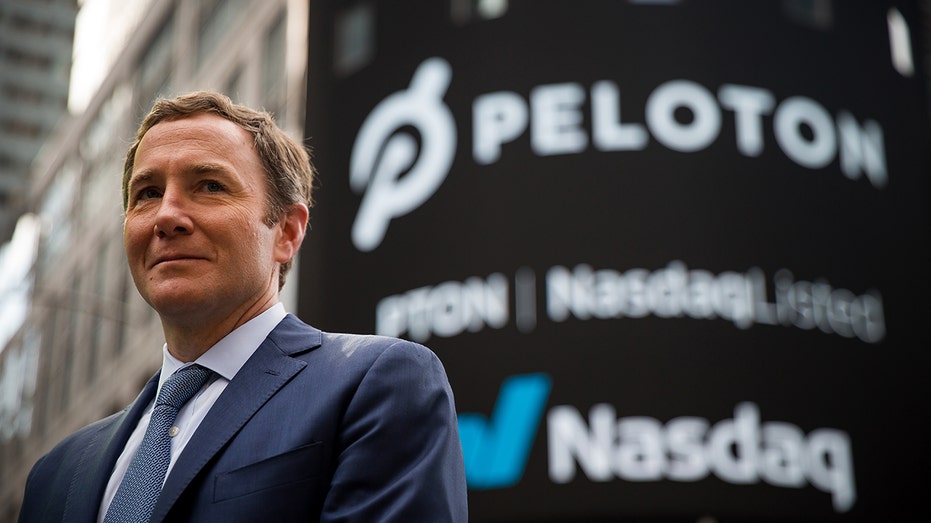Peloton CEO John Foley to step down, become executive chair
Company to name former Spotify CFO Barry McCarthy as replacement, overhaul board and cut costs
Peloton Interactive Inc. plans to replace its chief executive, cut costs and overhaul its board after a slowdown in demand caused the once-hot bike maker’s value to plummet.
| Ticker | Security | Last | Change | Change % |
|---|---|---|---|---|
| PTON | PELOTON INTERACTIVE INC. | 4.62 | +0.23 | +5.35% |
Peloton co-founder John Foley, who has led the company for its entire 10-year existence, is stepping down as CEO and will become executive chair, the company told The Wall Street Journal. Barry McCarthy, the former chief financial officer of Spotify Technology SA and Netflix Inc., will become CEO and president and join Peloton’s board.
The New York company will also cut roughly 2,800 jobs, affecting 20% of its corporate positions, to help cope with the drop-off in demand and widening losses. The cuts won’t affect Peloton’s instructor roster or content.
PELOTON'S POTENTIAL SUITORS: AMAZON, NIKE, APPLE, DISNEY OR SONY?
A little over two weeks ago, activist investor Blackwells Capital LLC called for Peloton to fire Foley and explore a sale of the company, which the Journal has reported is attracting potential suitors including Amazon.com Inc.
"We are open to exploring any opportunity that could create value for Peloton shareholders," Foley said pin an interview. Foley, a former Barnes & Noble Inc. executive who co-founded Peloton 10 years ago last month, declined to comment further.

Peloton Interactive Inc. plans to replace its chief executive, cut costs and overhaul its board after a slowdown in demand caused the once-hot bike maker’s value to plummet. (Peloton)
The naming of a new CEO could indicate that Peloton sees an independent future for itself, or at least doesn’t want to sell at the current depressed share price. Any deal would likely require Foley’s support, as he and other insiders have shares that gave them control of over 80% of Peloton’s voting power as of Sept. 30, according to a securities filing.
Peloton was once a pandemic darling. As homebound customers ordered its exercise equipment and streamed its virtual classes, its valuation soared. The company’s fortunes have recently sagged, and its stock had been trading below its September 2019 IPO price of $29 a share as lockdowns eased and gyms started to fill up again.
The company’s value has fallen from a high of around $50 billion roughly a year ago to around $8 billion last week, before its shares rose 21% Monday on news of potential suitors.
Peloton has said it was planning cost cuts and reviewing the size of its workforce and production levels. Investors have been awaiting details of its plans, which will accompany fiscal second-quarter results Tuesday.
Messrs. Foley and McCarthy said that the company had long been planning to hire a new CEO and that McCarthy entered the picture in the past few weeks.
"I have always thought there has to be a better CEO for Peloton than me," said Foley, 51. "Barry is more perfectly suited than anybody I could’ve imagined."
McCarthy, who is in his late 60s and plans to move from California to New York, said his strength is a deep understanding of content-driven subscription models, while Foley’s are in product development and marketing.

Peloton co-founder John Foley, who has led the company for its entire 10-year existence, is stepping down as CEO and will become executive chair, the company told The Wall Street Journal. Photographer: Michael Nagle/Bloomberg via Getty Images
"Together we can make a complete grown-up and build a really remarkable business," McCarthy said. He has consulted for Peloton investor Technology Crossover Ventures, sits on the boards of Instacart Inc. and Spotify, and was CFO of the music-streaming service until early 2020.
Peloton is making other personnel changes: William Lynch, the company’s president, will step down from his executive role but remain on the board; Erik Blachford, a director since 2015, will leave the board; and two new directors will be added.
The new directors are Angel Mendez, who runs a private artificial-intelligence company focused on supply-chain management, and Jonathan Mildenhall, the former chief marketing officer of Airbnb Inc. and co-founder of branding company TwentyFirstCenturyBrand.
Peloton said it expects to cut roughly $800 million in annual costs and reduce capital expenditures by roughly $150 million this year. The company will wind down the development of its Peloton Output Park, the $400 million factory that it said in May it was building in Ohio, and reduce its delivery teams as well as the amount of warehouse space it owns and operates.
CLICK HERE TO READ MORE ON FOX BUSINESS
"Where the company got over its skis is it built out a cost structure as if Covid was the new normal," McCarthy said.
Foley has said the company is acting to improve its profitability and would share details with earnings. The company reported preliminary second-quarter revenue of $1.14 billion and said it ended the period with 2.77 million subscribers.




















